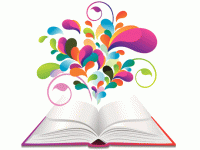A Celebration of Learning
Back in December, on the long drive from Texas to Utah, I had some time to reflect on many things. I considered the reasons why we look forward to the holidays. They are full of celebration, we find out what's going on in the lives of relatives and friends, and we simply enjoy the time together. For some strange reason, that got me thinking about reading Harry Wong's seminal book, The First Days of School, and I remembered being profoundly impressed by his concept of starting school off with a bang by throwing a party on the first day.
So there I was, traveling thousands of miles, through iffy roads and weather to attend several parties and festivities with my family; what celebrations have I had in my own classroom? Even when the students were leaving for winter break, and asked for a celebration, "Bah humbug. We have learning to do!" was my answer.
When I reflect even further, I think I started the year off with enthusiasm and energy. We dove right into learning on the first day, but I would not call it a celebration of learning. Yes, there were micro-celebrations that occurred with individual students as they mastered what I was teaching; "Good job! Way to go! You got it!" but I did not once identify what has been learned, nor did I take the time to celebrate how far the students had come in their learning. Why not?
I feel that in many cases, my students are falling short of where I want them to be in their academic progress. I feel a constant pressure to get them caught up so wrack my brain and I try strategy after strategy to find ways to reach them. I constantly examine their shortcomings; they are struggling with verb tenses, pronunciation, and vocabulary retention. I easily berate their poor behavior and underdeveloped work ethic as the cause of their less than stellar performance.
I accept my role in their lack of superstar achievement and I think of different ways that I can help them, but ultimately I think it is their fault for not being as enthusiastic and interested in learning Spanish as I am. Hmm, maybe there is the key. What have I given them to be enthusiastic about? (Is that a twinge of remorse?)
I know how poorly the students are doing, and the messages that I consciously give them (and subliminally give them) and the attitude I project are that they are not learning well enough. I give them their test results and their homework scores so they should know how well they are doing, but then I tell them, "Let's look at what you did wrong." Why don't I celebrate what they did right? Well, I know why. I feel that if I don't spend the time to correct their mistakes, they will keep making them. That is perfectly logical thinking, right? Can I really say that is an effective strategy? Nope... (I'm feeling really uncomfortable now.)
What if I turn things around? It's not too late! Can't I first celebrate the gains they made, or the answers that were correct, leaving them with the feeling of wanting to celebrate more? Well of course, but that would mean that I have to look at things completely differently when I correct my tests and quizzes. I would have to hone in on where they got it right rather than their mistakes. In analyzing data I would have to graphically illustrate their successes rather than make depressing graphs and charts of their deficiencies. I would have to take the time to praise students as a group and individually for even small gains in learning achievement. (Is that all bad?)
To do this I will need to clear more room on my walls for displaying excellent student work. I will have the students keep track of their successes in their notebooks, and I will keep the successes updated on their progress charts on the wall. I will have to change my attitude and look for (and find) successes to celebrate. I could take some time at the end of each class period to celebrate what we have learned that hour. I know what I'll do. I'll have students write down what they are proud of learning in my classroom as an exit ticket. I'll have the students frequently teach their elbow partner what they have learned. I'll be more genuine and generous in my praise for good work. I'll start off with showing the students how much they know and how far they have progressed by giving them a test over the things they have mastered. Then we will celebrate! Wow...This is exciting! (Did my heart just grow three sizes?)
I always have a hard time coming up with any new year's resolutions and even though it's spring, I have stumbled across a really good one: I will celebrate my students' learning successes as often and as effectively as I can. I will change my attitude of pessimism and negativity to one of encouragement and hope
All this reflection has been productive and I think Harry Wong would be proud. In what ways do you celebrate and praise learning in the classroom? Please share in the comments below.
